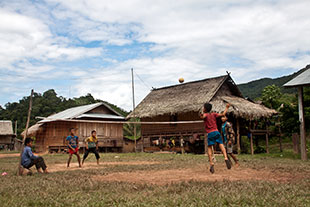This project supports six Asian least developed countries (LDCs) – Bangladesh, Cambodia, Lao People’s Democratic Republic, Myanmar, Nepal, and Timor-Leste – to strengthen the capacity of their health systems to adapt to the impacts of climate change. In particular, the project aims to strengthen institutional capacity to improve health sector planning and effective decision-making to ultimately develop climate-resilient health systems.
The problem
Asian LDCs, including the target countries of this project (Bangladesh, Cambodia, Lao PDR, Myanmar, Nepal, and Timor-Leste), remain particularly vulnerable to climate-related health risks with limited capacity to prepare for and respond to these challenges. The health of these populations is threatened by a variety of climate change risks, such as deaths and injuries from extreme events (e.g. heatwaves, storms and floods), outbreaks of climate-sensitive diseases (water-borne, food-borne and vector-borne infections), and food insecurity and malnutrition (often due to droughts).

As weather events become increasingly volatile due to climate change, it is critical to strengthen the capacity of health systems by considering climate risks in health policy and decision making, interventions, and surveillance and early warning systems. Currently, climate information services and early warning systems are not adequately developed to effectively prepare for and respond to the increasing climate threats occurring in these countries. There is also limited awareness of the health risks posed by climate change, in part due to the novelty of the concern, and in part due to the medium to long timeframes of projections and indirect mechanisms linking climate change to major health outcomes. Improving the institutional capacities of Asian LDCs to adapt and respond to the health risks induced by climate change can therefore lead to significant reductions in prospective adverse health outcomes.
The goal
The overall goal of this project is to increase the adaptive capacity of national health systems and institutions to respond to and manage climate-sensitive health risks in six Asian LDCs (Bangladesh, Cambodia, Lao PDR, Myanmar, Nepal and Timor-Leste).
The project
The four-year project, initiated in 2019, has four main outcomes:
Outcome 1: Institutional capacities are strengthened to effectively integrate climate risks and adaptation options in health sector planning and implementation
It is critical to ensure that the health sector is properly represented in the development and implementation of regulatory processes (such as the national Adaptation Programmes of Action (NAPAs)). This project therefore supports Governmental ministries in participating countries to incorporate climate risks and opportunities into national health plans, policies and programs.
Outcome 2: Effective decision-making for health interventions is enabled through generation of information and improved surveillance and/or early warning systems
This outcome addresses the need to link health and climate/weather information systems to improve surveillance and, where feasible, establish early warning systems. Countries will be supported in collecting detailed information through vulnerability assessments and other tools to determine health burdens and steps needed to establish surveillance and preparatory systems.
Outcome 3: Climate resilience is enhanced in health service delivery
Currently, the health plans and disaster management of the selected countries do not include climate change considerations. Effective health adaptation therefore requires substantial improvements to existing health delivery systems. This outcome aims to enhance the consideration of climate change within climate-sensitive disease interventions and emergency preparedness to improve the effectiveness of health systems.
Outcome 4.1: Enhanced regional cooperation and knowledge exchange for promoting scale-up and replication of interventions
This Outcome, implemented by WHO, addresses technical gaps for health adaptation to climate change at country level. as well as knowledge management and coordination at the regional-level.
Outcome 4.2: H-NAPs are effectively integrated into ongoing NAP processes
This Outcome, implemented by UNDP, provides technical assistance to participating governments to effectively embed the health component (under Outcome 1.1) in the existing National Adaptation Plan (NAP) processes to ensure climate change is integrated into planning across sectors.
Partners
The project is funded by the Global Environment Facility (GEF). Project implementation is led by WHO Country offices (Bangladesh, Cambodia, Lao PDR, Myanmar, Nepal and Timor-Leste), with support from WHO-HQ and the United Nations Development Programme (UNDP), and in partnership with participating national governments.
The future
The impacts of climate change on health are exacerbated in many Asian LDCs – including Bangladesh, Cambodia, Lao PDR, Myanmar, Nepal, and Timor-Leste – where health systems often struggle to manage existing health hazards and their capacity to adapt to additional climate change-related health risks is limited. This project can therefore save millions of lives in countries that are not only particularly vulnerable to health impacts of climate change, but also face additional barriers to address them.
